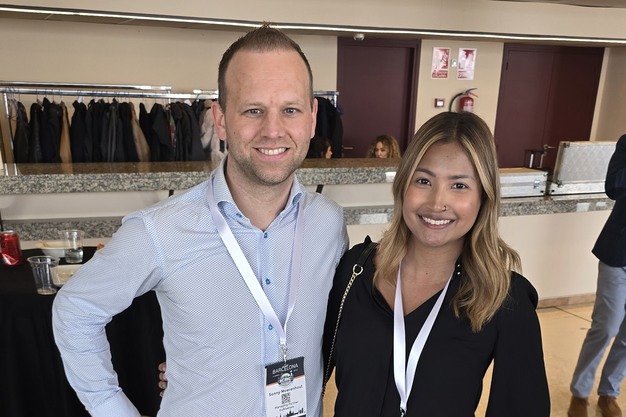"Many people operating in the cannabis industry don't have access to this kind of expert information. We want to make that information more accessible, providing a free exchange of knowledge," says Atiyyah Ferouz, Founder of the International Cannabis Quality Standards Association (ICQSA). Atiyyah launched ICQSA because she wanted to bring together a group of cannabis industry stakeholders that are representative of the various markets in the cannabis space. "Together, we will develop best practice guides, look into the development of standards internationally, and provide regulatory guidance."
ICQSA members at ICBC Barcelona. From left to right: Kate Holste (Boveda), Jakob Eipp (Luxora), Atiyyah Ferouz (ICQSA Founder and Executive Director), Stefan Roehrl (Luxora), Jocelyn Prefontaine (Twister Technologies)
Launching an association
Atiyyah made the decision to launch the ICQSA because she realized there wasn't an existing international organization that tackled the various activities she believed were essential to advancing the cannabis industry globally. "A mixture of best practice guides, standard development, and policy advice," she explains. "I think those things feed into one another. I wanted to do all of these things at once while focusing on moving the industry forward."
The first focus of ICQSA will be developing best practice guides. "Later on, we're moving into standard development. When and how we do everything is all up to the collective association," Atiyyah says. "The cannabis industry is very dynamic, it changes month to month. It would be naïve of us to say that we know exactly what is going to happen in a year or two. I wanted to create a group of people that understand the current industry challenges, that could create solutions to these problems together."
Best practices
According to Atiyyah, a lack of best practices causes a myriad of issues. "First and foremost, when new markets come online and don't do well, it hurts all of us. It creates a negative perspective on cannabis and reduces our credibility as an industry overall," she says. "We have to be mindful of the fact that there's so much stigma around the use of cannabis in so many countries. With every single step forward that we make as an industry, we need to be very careful about how we make those steps."
Atiyyah gives the UK as an example. "Medical cannabis is legal there, patients can get a prescription. Yet this has not stopped many patients from being stopped by police officers who are challenging their prescription, sometimes even charging them for it. This is happening to people with legal cannabis prescriptions," she says. "So what happens to the rest of the population when they see this happening? It probably makes them hesitant to get access to medical cannabis. It makes everyone think we haven't found a way to organize ourselves as an industry or that we're not rolling out the regulations correctly. In turn, it gives countries that are considering legalization more reasons why they shouldn't. Best practices benefit everyone: they will help businesses operate better and will help regulators make better decisions."
Sonny Moerenhout (Cultivators) and Atiyyah Ferouz
A common goal
Atiyyah explains that the goal of the best practice guides is to have a point for everyone to move towards. "Right now, everyone has their own regulations. We don't expect markets to change those regulations overnight. But it's good to have a goal that we're all moving towards, a set of guidelines and practices. If we don't have those, how do we make sure we're lobbying towards the same point? No one is 100% happy with their cannabis regulations, every market has its problems. On a global scale, if we don't all work toward the same place, we're never going to be able to move cannabis around easily. That's going to create even more barriers for us to expand our industry and cannabis supply chain," she says. Accordingly, Atiyyah's dream is to have a much more globalized cannabis supply chain in the next 5-10 years. "To have it be easier to move plants and products around the world. That's one of the overarching missions of our organization."
Cultivation
Atiyyah thinks the cultivation best practice guides, in particular, are going to be very interesting. "There are a lot of competing theories about how to cultivate. We're doing our best to have a very agnostic approach. We won't be publishing something that says, 'You should only grow like this.' We want to offer best practices in a variety of areas. Whether you want to grow aeroponically or in living soil, here are the best practices suited for that."
According to Atiyyah, there is something to be said for cannabis cultivation being a mixture of preference, art and science. "Even if a product is considered good quality, the consumer can be looking for something different. What we have to do is provide information and guidance so that growers can exercise the strategy they want, but with as much evidence and information as possible."
Memberships
Atiyyah explains that the members are the heart of the organization. Current members include The Australian Cannabis Group, Boveda, Elevated Signals, Twister Technologies, Cultivators, Global Cannabinoid Solutions, and Luxora. "The members will help develop the best practice guides. They all have a lot of experience and believe in the mission that ICQSA has: moving the global cannabis industry forward."
For more information:
ICQSA
www.icqsa.com
